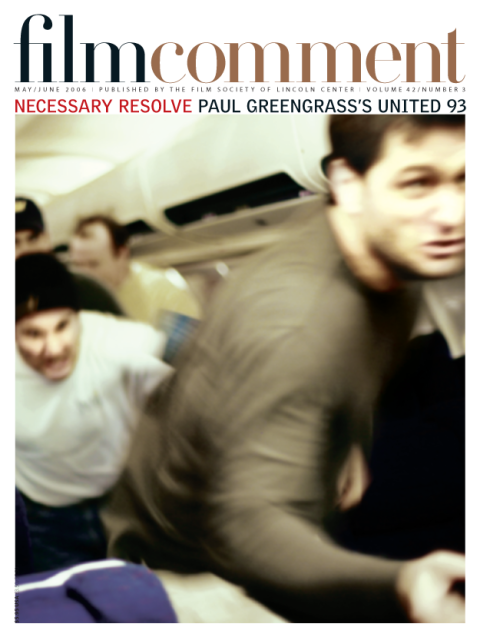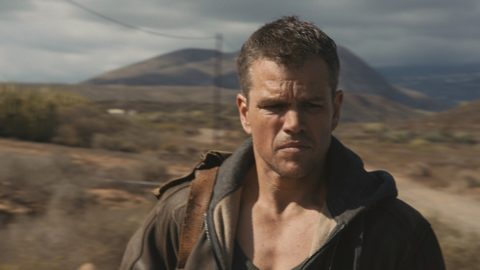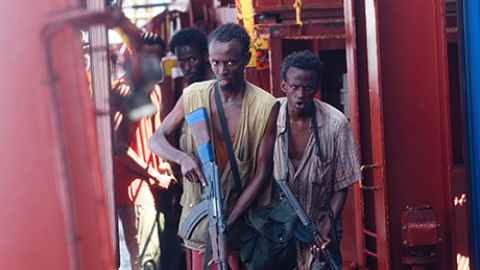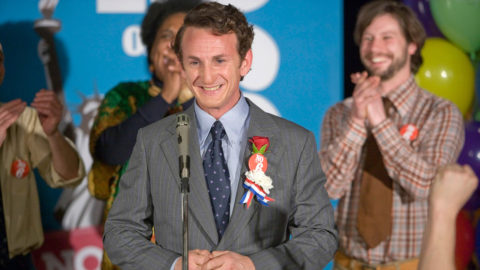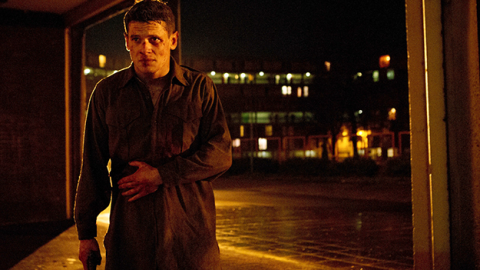To chronicle the events of the morning of September 11, 2001, on film is to accept a set of inescapable constraints. It is to venture onto sacred ground bearing a daunting burden of responsibility—to the facts, to the sentiments of the immediate families, to the American mood, to the sensitivities of a still fraught and roiling national psyche. It’s hard to imagine many filmmakers capable of walking this line and not succumbing to the temptations of mythmaking and monumentalism, but anyone who saw 2001’s Bloody Sunday would know that English docudrama director Paul Greengrass belongs to the select group of individuals up to the task.
A stark, wrenching, and overwhelming viewing experience, shot in a cinema vérité style that becomes increasingly fragmented as events accelerate, United 93 is a film of two interwoven parts; its first half is primarily concerned with depicting what went wrong on the ground, offering a riveting and meticulous inside view of the appalled helplessness of those manning the Eastern Seaboard’s air-traffic-control system and the failure of the air defense chain-of-command. Devoid of sensationalism, the film’s second part details the hijacking of United Airlines Flight 93 by five Muslim terrorists—and the passengers’ subsequent struggle to retake the aircraft by force. Greengrass’s version of what transpired aboard the Boeing 757, extrapolated from the behavioral profiling of each person on the plane and the eyewitness reports given by the jet’s passengers using cell and air phones, is ultimately the product of well-considered, rigorously conscientious speculation. By contrast, the events down below are reenacted, with a number of real-life participants playing themselves, most notably the head of the National Air Traffic Control Center, Ben Sliney, the man at the eye of the 9/11 hurricane.
In a very real sense, Greengrass hasn’t simply accepted the intrinsic constraints of this undertaking, he’s embraced them, boxing himself in even more by entrenching formal guidelines that serve as aesthetic counterparts to the moral obligations built into the subject matter. Hence the 91-minute flight is shot in real time and, a few brief preliminary scenes aside, the film’s scope is narrowed down to a handful of settings: five windowless control rooms and the inside of the passenger jet. It’s a film composed entirely of interiors, of totally controlled environments in which control is irrevocably usurped. Aside from a bird’s eye view of Manhattan at night in the film’s opening moments, Greengrass permits himself to shoot only from camera positions that can be justified by the conceivable presence of a human observer—we never see the exterior of the plane once it’s airborne, and the devastation of the Twin Towers is seen only from the remove of the Newark Airport control tower and the television screens in the various control rooms.
Allowing only the briefest (but nevertheless gasp-inducing) glimpses of catastrophe—the distant form of an airliner flying low across the horizon towards Manhattan; the ground rushing up to meet a plane locked into an irreversible nosedive—United 93 can be said to present the events of 9/11 strictly as a series of abstractions unfolding on the radar screens and monitors of air-traffic control centers and in the operational chatter of the men and women staffing them. As such, its moral stance is that of a somber, uncompromising anti-spectacle.
Greengrass’s film is many other things besides: a cathartic act of bearing witness, an experiment in therapeutic reenactment, an anti-procedural, a meditation on the agonizing limits of communication—and a memorial.
When all is said and done, Greengrass got it right.
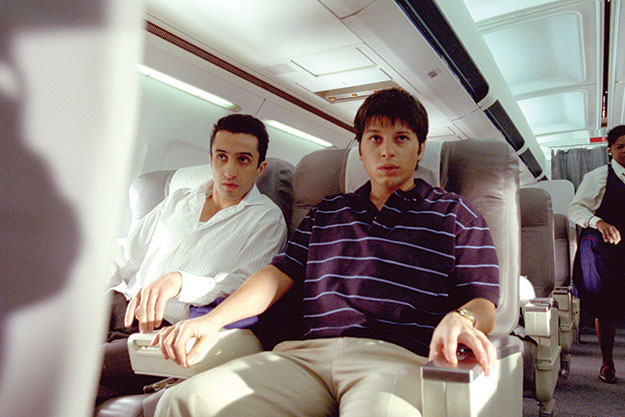
Do you consider the film a dramatization, a re-creation or a reenactment?
It’s all of those things, under the umbrella of a film. It’s a catharsis, it’s a reliving, it’s a reconstruction. It’s a hypothesis.
Is it intended as entertainment?
No.
How do you deal with the question of its presentation in an entertainment environment?
I don’t have a problem with it at all. I think that Hollywood—if one can use that term, because that’s a generalization—has many missions and always has. Obviously its prime mission is entertainment and escapism. But Hollywood has always seen itself as having a mission, which it has fulfilled at various times, of making films about the way the world is.
But this film scraps the basic principle behind most of the films in that tradition—the use of identification with a character’s point of view.
The predominant reason for that was that I wanted to make a film that felt collective, filled with many voices, all of whom were engulfed in this event, in the suddenness and unimaginable nature of it. You do come to know characters. But I agree it’s not structured or told in a sort of conventional character sense, because I wanted it to feel real.
What implications did that have for how you filmed things?
Well, I think the most important thing, from my point of view, is that it’s down to observation. If you’re trying to make a film that feels very well observed, you must be very careful that that is your point of view. That it is dispassionate. It is not judgmental. Now, that sounds like a paradox, because I think that the film is absolutely clear about the abhorrent nature of these events. But it doesn’t tell you that. It shows them to you. So you observe characters from the outside. You never learn their interior selves as revealed through dialogue. And that itself creates very high degrees of emotionality, if the performances are extremely truthful. And that leads you to make all sorts of choices about removing contrivance. So, for instance, you don’t show the other end of any of the phone calls, because that’s a contrivance. You could only do that if authorially you knew they were going to take place. If you always take the observational logic of “If I had to be here and I was watching, what would I see?”—as long as you are disciplined and follow that logic remorselessly all the way through—you can reap rich emotionality. It’s harder to do, I expect. And what that does is define those characters very starkly.
They’re defined by what they do.
By what they do, exactly, not by who they are. You learn who they are by what they do.
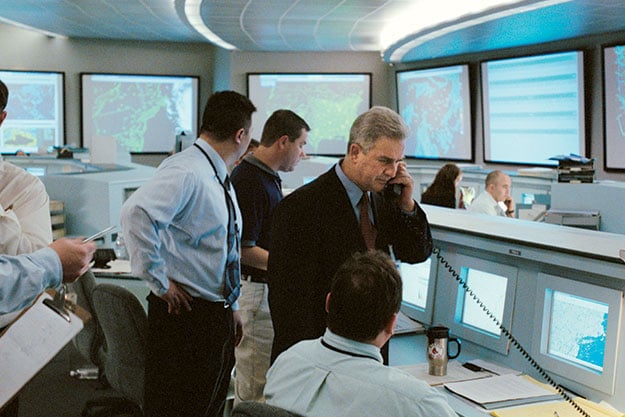
When you began to sketch out in your mind what would take place, did you know all along that Burnett [Christian Clemenson] would become the passengers’ leader?
Going into a process like this, you’ve got to have some underlying ideas. Otherwise it’s a sprawling mess. But your ideas have got to be capable of being challenged or even overturned, based on what collectively as a group of actors you discover through rehearsal. The critical thing here was to gather together as a group and say, What might have happened? Here’s what we definitely know, and here’s what seems to be reasonable supposition—now let’s take those two elements and take what you guys can glean from the respective families about the characters, and let’s go sit in a room for a couple of weeks and try to “play” in such a way that we can unlock a believable truth.
There was a very strong and abiding belief amongst all those families, unanimously, that this had been a collective experience. And one of the things that frustrated them about previous versions of this story was that it had always been told as the story of a group of three or four heroic men with everybody else forgotten. And I believed them. For two reasons. One, because they told me so with such vehemence, independently, so many times—“My son, my husband, my wife, wouldn’t have just sat there, they would have had something to say.” Secondly, based on my own view of human nature, it could not possibly have been the case that you would have all the passengers pinned at the back and suddenly three or four guys would just decide to do something. It doesn’t happen like that. There’s a complex in-group interaction that has got to go on before you get to an insurrection in a situation like that. So the job of the film is to convey that collective sensation. Now, having said that, I also believe that in human behavior everybody doesn’t get to the same point at the same time. Different people have different impulses—and leadership and going first is something that happens and has to be reflected.
Now, if you were to ask yourself the question, “How does an insurrection begin in abstract terms? How would it begin on that airplane?”—we had a lot of these discussions sitting in the airplane in those last nine rows, so you feel the proposition was concrete, in front of you. Well, it’s obvious: it would start in the proximity of young males, sitting together, because you need that spark, that combustion—that thing that males tend to do. We’re animals, and in a combat situation or in a stressful environment or somewhere where physical threat is present, a man will look at another man in a certain way. It’s built into our psyche. If you’re a big man, you would naturally look for another big man, and unconsciously it would pass between you, the kind of “Are we going to? Could we, might we? Yeah, now.” What do you find when you follow that thing? You find that Burnett sat next to Bingham on that airplane, and they were two very can-do types. Bingham was a self-employed guy, ran his own business, very much a make-his-own-rules type, in terms of his life. A delightful man by all accounts, but the sort of guy who, if somebody tried to break into his car, would chase them 500 yards down the road and wrestle them to the ground, as he once did—very easily provoked. If you were to look at that group and say, “Who would be the general?”—crudely, it has to do with your background, your psychological makeup, and your experience. Well, Burnett was perfectly positioned to be commanding to younger males but also capable of offering physical leadership to older males. He was an extremely successful businessman, extremely articulate, extremely commanding. He was running quite a large company, used to giving orders and used to having them followed. He was in that perfect mid-position. When put in a situation where leadership skills were required, we all felt it would be somebody like Burnett.
It’s interesting that you have made a film about collective experience and to a large degree made it collectively.
Totally. The whole thing was. It was an experiment, if you like. It was an attempt to draw together a unique group of people who shared the idea that it was time to make sense of this event. And that group of people began with the families. Because they were the foundation of it all. Then I had to find working actors who were not well-known movie stars, because I wanted the film to have the feeling that any one of these people could be you or me. There was nothing exceptional about any of the people on the airplane, or anywhere else in those environments on that day. Then it was a question of reaching out so that we had enough skills in our group to make informed decisions, which meant, Let’s not have actors playing airline pilots. We need working pilots. J.J. [Johnson], who played [Captain] Dahl, is a working United pilot. The same with the stewardesses, the air-traffic controllers, the military air-traffic- control people. A high number of those people are either current professionals and/or professionals who were in those places on that day. Collectively, we gathered together to try to make sense of this event, to try to reconstruct it, to relive it, to dramatize it, and ultimately to make a film that is the product of our two months talking to each other. We didn’t all agree, but the process was to synthesize all of our different instincts, our different knowledge, and re-create a believable truth that reflects the record.
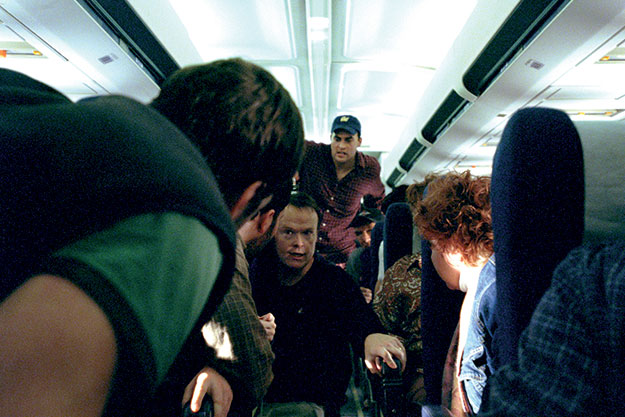
Can you give me an example of how this affected the direction you took?
The sort of mythic view of Flight 93 has the passengers grabbing a food service cart at the end of the airplane in order to run it down the central aisle. Well, that could never have happened. Because we had a real airplane with real stewardesses whose job was to push those carts, and they just laughed—they said, “You could not do that. It would be impossible. We have a hard enough job getting those carts up and down, lugging them.” If you’re trying to get to a man with a bomb, who’s 20 feet in front of you, the very last thing you would do is go charging off behind a cart. You’d run at the guy, because speed is your only chance. That’s an example.
What kind of discoveries were made at the rehearsal stage?
We had a large rehearsal space that was actually two rooms with a large open space between. In one room, we set up plastic chairs as if it were an airplane. In the other, we arranged chairs to approximate the stages that you move through in order to get onto an airplane—so you walk in the door of the airport, you check in, you go to security, you go from the security to the gate, then you get on the airplane. We laid those out so that you could move through a line of chairs representing each stage, each barrier, until you got on the plane in the other room. We decided to do it just to get a feel of what that journey was. And it was quite amazing how collectively we could all see straightaway—and it never occurred to me, even though I’d been thinking about it for a couple months before we started rehearsing—the actors said, “We have an intense feeling of being processed, and therefore you get into a psychological space of obedience.” You get up in the morning, you’re a normal sentient citizen. You walk into an airport, and you’re being processed. By the time we sit in our seats, we are subtly conditioned psychologically to do exactly what we’re told. And they showed me something very important that I’d never understood: our modernity conditions us towards obedience. In order to have our supremely sophisticated systems, whether they’re aviation or whatever, it takes a high degree of processed obedience from us.
And that is precisely the quality that the hijackers needed that day, because without it they could never have deceived everybody that they had a bomb. The thing that becomes clear when you reconstruct and live this is how unbelievably flimsy the hijacker proposition was. A couple of plastic knives, a bit of children’s clay, a few bits of wire, and a couple of batteries strung together—that’s it. And you’ve got to take over a whole airplane with lots of significant men. You do it because they have been processed to be passive.
Is this what you were getting at in the quote in the press notes about this event embodying the DNA of our times? Or was there some larger political inference?
Well, I think it goes to asymmetrical warfare. Our systems are our vulnerability. Why do groups wedded to political violence strike at mass transportation? It’s because anything that involves a system is very vulnerable.
On another level, the film is really about communication.
Yeah, and miscommunication. The great difficulty when you look back at something that happens is that you get seduced by and must always fight the idea that because it happened that way it was meant to happen that way. My understanding of the world is that things happen in a complex way, and trying to put your finger on the underlying forces is hard, but if you look at it and strip out conspiracy theories and necessary cause-and-effect—that if something happens, something else is bound to happen—you can generally explore what actually happened. Things sometimes happen because they’re planned, but sometimes things happen despite the fact they’re planned, in wrong ways, and that has to do with the fact that chains of communication and information get corrupted. That’s what happened on that day. That is something that I think is very much a feature of our world today.
There’s this highly sophisticated system of communication on the ground, and then this very simple, basic kind of communication on the plane.
And it’s similar isn’t it? The chattering, they’re all interrelated, aren’t they? You’re right, one’s human and very intimate, but it’s the same thing. We can’t have our systems without accurate communication, but if our communications break down, our systems break down, and vice versa. And ultimately, I think, I hope what comes out is the idea of the fragility of our modernity, our democracies, our technological systems.



